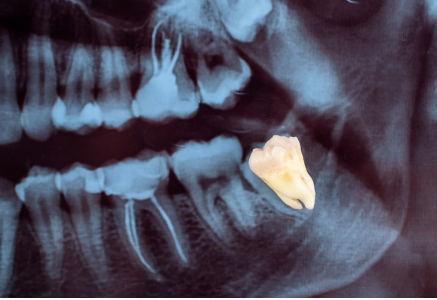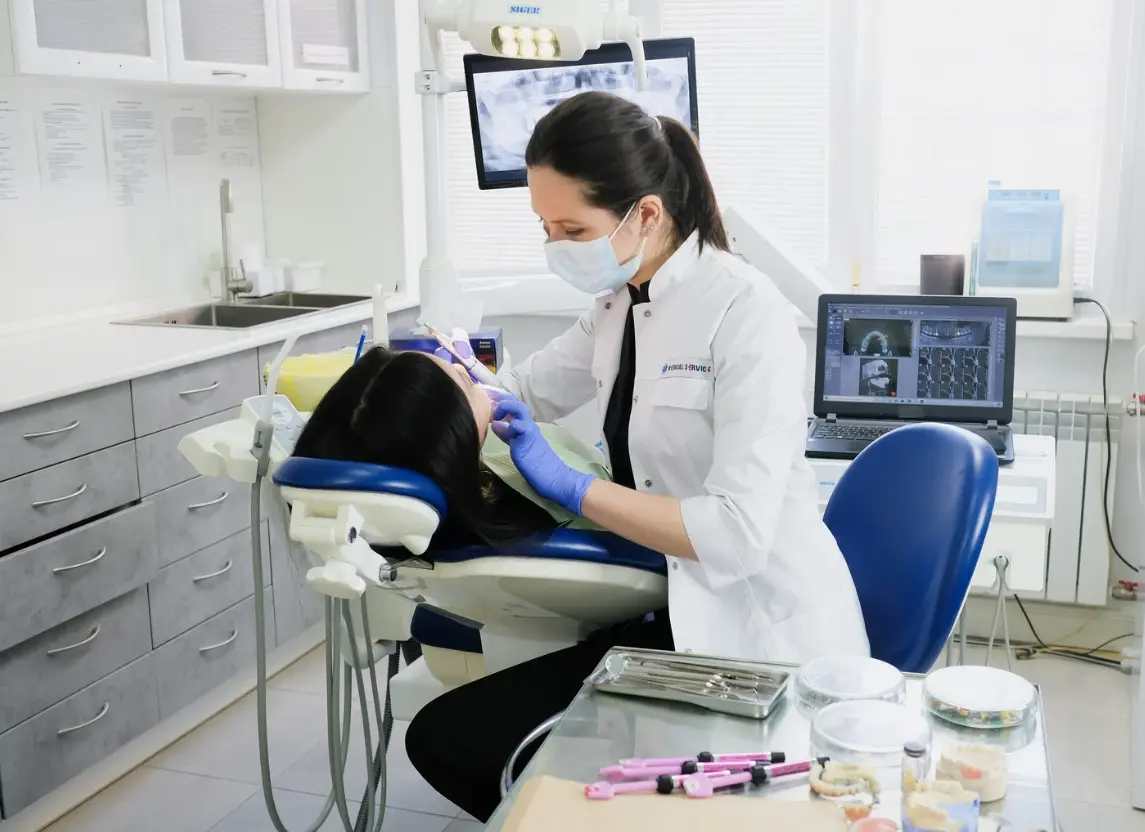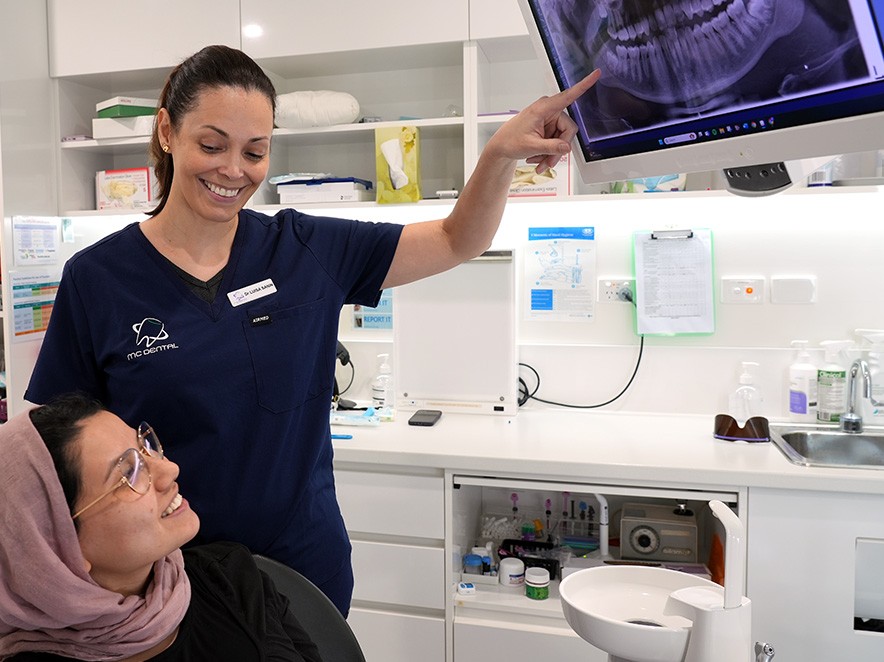
MC Dental Clinics Care for You
Understanding and Managing Wisdom Tooth Pain
One of the common issues for which we receive patients across our clinics is wisdom tooth pain. Wisdom teeth, also known as third molars, are the last set of teeth to emerge in the human mouth. While some people never experience issues with their wisdom teeth, many others face discomfort and pain as these teeth make their appearance. We want to help you understand the causes of wisdom tooth pain, methods to alleviate the discomfort, and when to seek professional dental care.
Watch the explaining video from MC Dental dentist, Dr. Sherrie, for the causes, relief, and when to see a dentist.
What Are Wisdom Teeth?
Wisdom teeth are the final set of molars that typically emerge between the ages of 17 and 25. Most people develop four wisdom teeth, one in each corner of the mouth. Wisdom teeth are remnants of our evolutionary past when our ancestors needed extra molars to grind tough, foraged foods.
Why Do Wisdom Teeth Often Cause Problems?
- Limited Space: Modern human jaws are often too small to accommodate these extra teeth, leading to overcrowding.
- Impaction: When there isn’t enough room, wisdom teeth may become impacted, meaning they can’t fully emerge or they grow at an angle.
- Partial Eruption: Sometimes, wisdom teeth only partially break through the gum, creating a flap of gum tissue that can trap food and bacteria.

Causes of Wisdom Tooth Pain
Understanding the reasons behind wisdom tooth pain can help you better manage the discomfort and know when to seek professional help. Here are some common causes:
- Eruption Pain: As wisdom teeth push through the gums, it can cause soreness and discomfort in the surrounding area.
- Impaction: When a wisdom tooth is impacted, it can cause pressure and pain as it pushes against other teeth or jawbone.
- Infection: Partially erupted wisdom teeth can create pockets where bacteria accumulate, leading to infection and inflammation (pericoronitis).
- Cysts: In some cases, a fluid-filled sac called a cyst can form around the wisdom tooth, causing pain and potential damage to the jawbone and nearby teeth.
- Damage to Adjacent Teeth: As wisdom teeth emerge, they can push against other teeth, causing misalignment and pain.
- Decay: Due to their location, wisdom teeth are often challenging to clean properly, making them susceptible to decay, which can cause pain.

Symptoms of Wisdom Tooth Problems
Recognizing the symptoms associated with wisdom tooth issues can help you identify the problem early. Common symptoms include:
- Pain or tenderness in the back of the mouth.
- Swelling of the gums or jaw.
- Difficulty opening the mouth fully.
- Bad breath or an unpleasant taste in the mouth.
- Headaches or jaw pain.
- Swollen lymph nodes in the neck.

Prevention and Relief Methods for Wisdom Tooth Pain
While you can’t prevent wisdom teeth from growing, there are several evidence-based ways to minimise discomfort and reduce the risk of complications:
1. Maintain Excellent Oral Hygiene
- Brush teeth thoroughly twice a day, paying extra attention to the back molars
- Floss daily, especially around the wisdom teeth area
- Use an antiseptic mouthwash to reduce bacteria
2. Saltwater Rinse
A warm saltwater rinse can be very effective:
- Mix 1/2 teaspoon of salt in a cup of warm water
- Swish the solution in your mouth for 30 seconds
- Spit out the solution (do not swallow)
- Repeat 2-3 times daily
3. Over-the-Counter Pain Relief
- Use pain relievers such as ibuprofen or acetaminophen as directed
- Apply oral numbing gels containing benzocaine to the affected area
4. Cold and Heat Therapy
- Apply an ice pack to the outside of your cheek to reduce swelling and numb pain
- Use a warm compress to alleviate jaw stiffness and promote blood circulation
5. Proper Diet
- Stick to soft foods that don’t require much chewing
- Avoid very hot or cold foods and beverages
- Stay hydrated by drinking plenty of water

When to Seek Professional Help
While home remedies can provide temporary relief, it’s important to know when to consult a dentist. Seek professional help if:
- Pain persists for more than a few days or becomes severe
- You experience difficulty swallowing or breathing
- You have a fever
- Swelling in your face or jaw becomes developed
- You notice pus or discharge around the tooth
- Your pain medication isn’t providing relief

Professional Treatment Options
Depending on the severity of your wisdom tooth issues, your dentist may recommend:
Monitoring: If your wisdom teeth aren’t causing significant problems, your dentist might suggest regular check-ups to monitor their growth.
Extraction: In many cases, removing the wisdom teeth is the best long-term solution. This can be done under local or general anesthesia, depending on the complexity of the extraction.
Antibiotics: If you have an infection, your dentist may prescribe antibiotics before considering extraction.
Operculectomy: For partially erupted wisdom teeth, your dentist might remove the gum flap covering the tooth to reduce the risk of infection.
Book an appointment at one of 6 MC Dental clinics.
Our professional dentists will help relieve wisdom tooth pain.
Call us on 03 8608 8968
or book online by clicking on the button below.
FAQ – About Wisdom Tooth Pain
Wisdom teeth usually emerge between the ages of 17 and 25, although some people may experience them earlier or later.
No, not always. If your wisdom teeth are healthy, fully erupted, positioned correctly, and not causing any issues, they may not need to be removed.
The duration can vary, but pain during the eruption process typically lasts for a few days to a couple of weeks. Persistent or severe pain should be checked & evaluated by a professional dentist for potential treatment.
Yes, wisdom tooth problems can sometimes cause headaches, particularly if they’re causing jaw misalignment or muscle tension. MC Dental offers dental emergency service, you can contact one of our 6 clinics across Melbourne, we will get you booked in as soon as we can.
It’s common for wisdom teeth to emerge at an angle or become impacted due to limited space in the jaw. If that’s causing pain, please seek professional help from dentist.
Most people fully recover within 3 to 4 days, although it may take up to a week. Complete healing of the extraction site can take several weeks.
While you can’t prevent wisdom teeth from growing, maintaining good oral hygiene and regular dental check-ups can help identify and address potential issues early.
Yes, problematic wisdom teeth can lead to overcrowding, misalignment of other teeth, increased risk of decay and gum disease, and in rare cases, cysts or tumors. So please visit your dentist as soon as you can.
Remember, it’s always best to consult with a dental professional for personalised advice and treatment. Regular dental check-ups can help monitor the development of your wisdom teeth and address any issues before they become problematic.
If you’re experiencing persistent or severe wisdom tooth pain, don’t hesitate to contact the dental clinic near you, we have 6 locations across Melbourne – Melbourne Central, Docklands, Glen Waverly, Westfield Doncaster, Brighton, and Highpoint shopping centre. Early intervention can often prevent more serious complications and ensure your continued oral health.







